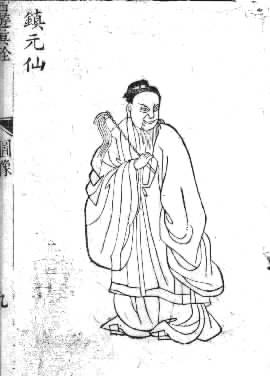Zhenyuan Daxian
Zhenyuan Daxian is a significant figure in Chinese mythology and Taoism, known for his profound spiritual powers and his role as a protector and benefactor of the faithful. As a revered deity, Zhenyuan Daxian's legends and teachings have been influential in the development of Chinese religious and philosophical thought, embodying principles of wisdom, compassion, and the pursuit of harmony with the Tao.
Origins and History[edit | edit source]
Zhenyuan Daxian's origins can be traced back to ancient Chinese literature and Taoist texts, where he is often depicted as a sage who achieved immortality through his dedication to Taoist practices and virtues. Over centuries, his story has been embellished with various mythical elements, making him a prominent figure in the pantheon of Taoist immortals.
Mythology and Legends[edit | edit source]
In the myths, Zhenyuan Daxian is often portrayed as a powerful immortal who assists other deities and humans in their quests, using his vast knowledge and magical abilities. He is known for his mastery over the elements and the natural world, as well as his ability to transcend time and space. One of the most popular tales about Zhenyuan Daxian involves his role in the epic battle against evil forces, showcasing his prowess and strategic mind.
Cult and Worship[edit | edit source]
The cult of Zhenyuan Daxian has been part of Chinese religious practice for centuries. Temples dedicated to him can be found across China, serving as centers for worship and community gatherings. Devotees often seek his blessings for protection, prosperity, and spiritual guidance. Rituals and ceremonies in his honor incorporate traditional Taoist practices, including offerings, chants, and meditation.
Influence on Chinese Culture[edit | edit source]
Zhenyuan Daxian's influence extends beyond religious worship, impacting Chinese culture, art, and literature. He is a subject of various works, including paintings, sculptures, and operas, which depict his legendary exploits and teachings. His philosophies have also contributed to the shaping of Chinese ethical and moral values, emphasizing the importance of living in harmony with nature and the universe.
See Also[edit | edit source]
Search WikiMD
Ad.Tired of being Overweight? Try W8MD's physician weight loss program.
Semaglutide (Ozempic / Wegovy and Tirzepatide (Mounjaro / Zepbound) available.
Advertise on WikiMD
|
WikiMD's Wellness Encyclopedia |
| Let Food Be Thy Medicine Medicine Thy Food - Hippocrates |
Translate this page: - East Asian
中文,
日本,
한국어,
South Asian
हिन्दी,
தமிழ்,
తెలుగు,
Urdu,
ಕನ್ನಡ,
Southeast Asian
Indonesian,
Vietnamese,
Thai,
မြန်မာဘာသာ,
বাংলা
European
español,
Deutsch,
français,
Greek,
português do Brasil,
polski,
română,
русский,
Nederlands,
norsk,
svenska,
suomi,
Italian
Middle Eastern & African
عربى,
Turkish,
Persian,
Hebrew,
Afrikaans,
isiZulu,
Kiswahili,
Other
Bulgarian,
Hungarian,
Czech,
Swedish,
മലയാളം,
मराठी,
ਪੰਜਾਬੀ,
ગુજરાતી,
Portuguese,
Ukrainian
Medical Disclaimer: WikiMD is not a substitute for professional medical advice. The information on WikiMD is provided as an information resource only, may be incorrect, outdated or misleading, and is not to be used or relied on for any diagnostic or treatment purposes. Please consult your health care provider before making any healthcare decisions or for guidance about a specific medical condition. WikiMD expressly disclaims responsibility, and shall have no liability, for any damages, loss, injury, or liability whatsoever suffered as a result of your reliance on the information contained in this site. By visiting this site you agree to the foregoing terms and conditions, which may from time to time be changed or supplemented by WikiMD. If you do not agree to the foregoing terms and conditions, you should not enter or use this site. See full disclaimer.
Credits:Most images are courtesy of Wikimedia commons, and templates Wikipedia, licensed under CC BY SA or similar.
Contributors: Prab R. Tumpati, MD

